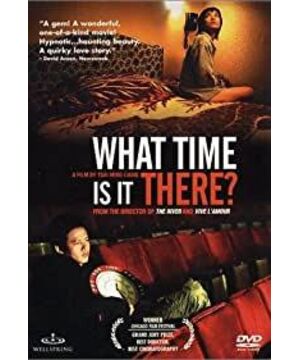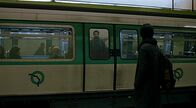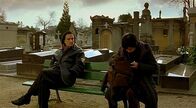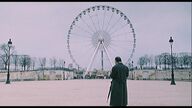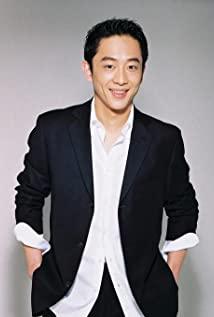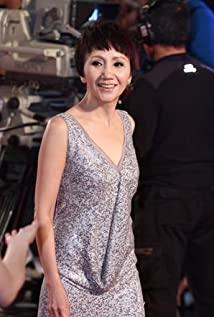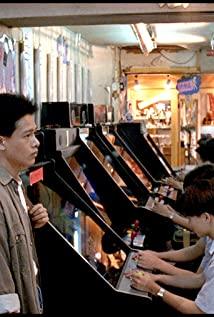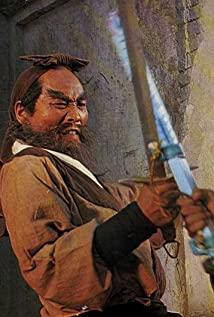We meet in the dark sea,
you have yours, I have my direction
- Xu "accidental"
a
how human communication might? This existential question is the theme of almost all of Cai Mingliang's films. Lao Cai's answer is consistent: the estrangement between people is insurmountable, or in other words, it is impossible for people to achieve real communication. This theme is most vividly expressed in "What Time Are You Over There".
Xiaokang set up a stand selling watches on the overpass next to Taipei Main Station, and Xiang Qi, a stranger, bought the watch he was wearing that could show the time in Taipei and Paris at the same time, and went to Paris. Xiaokang misses Xiangqi inexplicably, and turns back the clocks around him by seven hours to appreciate the time in Paris.
Well-off father passed away. Xiaokang's mother stubbornly believed that her husband's soul would return home, and wrapped the house tightly with a curtain, without a trace of light; she murmured her thoughts about her deceased husband to the big white fish in the fish tank.
Xiangqi lives alone in Paris. I can't speak French, I don't have friends, I can't make a phone call; I cry silently on a park bench.
All three live with anxiety. Xiangqi was lying in the dark of Paris listening to various sounds upstairs; Xiaokang's mother wrapped herself in the dark, checking at any time whether her deceased husband had eaten the food she made; Xiaokang was afraid of the dark and did not dare to go to the toilet at night.
A large number of fixed camera lengthened shots make the audience like an indifferent bystander, observing the boring, depressing and meaningless lives of the characters in the film. Character dialogue is minimal, and two characters rarely appear in the same space at the same time. The spaces they are in are often house corners, hallways, door frames, dark and cramped, like the big white fish that makes a lot of appearances—floating aimlessly in a narrow glass tank.
two
Soren Aabye Kierkegaard, the ancestor of existentialism, said that the real existence of each person includes joy, anger, pain, desire, cowardice, fear, etc. These emotions can only be controlled by each person himself. to understand. We cannot fully express our own emotions through language, symbols, logic, reasoning, etc. Just like a person in love, his/her sweetness, anxiety, happiness or anxiety, only he/she knows, others cannot comprehend. No matter how subtle the language is, it cannot describe the uniqueness and richness of each individual, the true existence of each individual. A natural inference from this view is that authentic people are alone and unable to communicate with others.
In "What Time Are You Over There", several characters are walking on the edge of the city, living in autism. To the bustling city around them, they are just "outsiders" and "marginal people". Xiaokang went from a truant high school student ("Youth Nezha") to an urn salesman ("Long Live Love"), to a stall selling watches, but he has never found a place in the city where he can settle down. Xiangqi came to Paris alone for unknown reasons, but she didn't know a word of French, and she didn't know anyone. She was wandering in this city, and she didn't know how to take root. Well-off mothers keep themselves in dark homes all day long, accompanied by portraits and fish tanks.
But man is afraid of loneliness, he/she is eager to get rid of isolation and helplessness, eager to find certainty in the absurd world. The characters in the film all yearn for love and are actively pursuing love. But their emotions are, after all, a one-way projection without any response. The so-called "amorous but ruthlessly annoyed".
Since he met Xiangqi, Xiaokang has been missing him so much that he called the telecommunication bureau to find out the time in Paris, and then dialed the watches he sold to Paris time one by one. Later, he even climbed to the top of the shopping mall to slow down the clock on the top of the building. . To understand Paris, he rented Truffaut's "The Four Hundred Blows" and watched it alone in the quiet of the night. And all this, Xiang Qi knew nothing.
The well-off mother misses her deceased husband. She leaves an empty seat for her deceased husband at every meal, adds meals and dishes for her husband, and postpones dinner until midnight so that her husband's soul can come back to eat together.
Xiangqi met a French man in a restaurant in Paris to help with ordering, looked at a Chinese man (Chen Zhaorong) in a subway station, and briefly met a Hong Kong woman (Yip Tong) in a coffee shop. After a brief conversation, eye contact, or physical contact, they remain strangers and may never meet again.
Encounter can not become fate, which is reminiscent of Qin Keqing's funeral in "A Dream of Red Mansions". In a village on the way to Tiejian Temple, Baoyu met the second girl of the village. The second girl unknowingly prevented Baoyu from moving her spinning wheel, but Bao Erye was so moved that he couldn't help it. It's a pity that the parting is just at the moment. "The car is light and the horse is fast, and I can't see a trace for a while." Although Baoyu "can't wait to get out of the car and follow her", but there is no way to do it, "I am disappointed and boring."
Cai Mingliang's world seems to be better than "Dream of Red Mansions" more ruthless. Although Baoyu is "disappointed and boring", there is always something beautiful left in her heart. And Xiaokang and others, after meeting each other, got endless absurdity. The three of them couldn't get a response to their pursuit of love, and their desires were suppressed, so they had to vent in a way that was not recognized by the mainstream society. Xiaokang and a prostitute made a "lathe clan", Xiangqi kissed a strange Hong Kong woman, and Xiaokang's mother masturbated to the portrait of her deceased husband...
Camus said that absurdity is "an encounter and an endless struggle", It is "generated from the opposition between the call of mankind and the unreasonable silence of the world" (Zhang Xianyun and Qiao Dongyi, "Anxiety" and "Choice" in New Generation Movies"). "What time are you over there?" Xiaokang and the others called, but there was silence.
Three
Taipei and Paris, these two symbolic cities, symbolize two worlds that cannot communicate: different times, different languages, and even the difference between yin and yang - Xiaokang's dead father appeared in Paris.
Several characters in the play encounter at least two kinds of barriers. There is a time gap between Xiaokang and Xiangqi. With modern transportation, the separation of spaces is no longer a problem, but time is still an issue, and it's not just the seven-hour time difference between Paris and Taipei.
Kieslowski said in his review of his "Three Colors Red", "Pure love can only be the reunion of the two halves of the same apple. However, after an apple is cut in half, it is The impermanence of life is thrown into nowhere, and the chance of meeting the other half (even if it is exactly the same) is close to zero." In "Red", Valentine and the retired judge are like the same apple cut in half, But they meet in a missed time - the old judge is 40 years older than Valentine. Therefore, Kieslowski believes that "it is almost impossible for completely compatible individuals to be compatible in erotic desire" (Liu Xiaofeng, "A Glimpse of Fragments of Love").
What separates time is two people who were born to be a pair. Maybe Xiaokang and Xiangqi are the two halves of the same apple. The film tells us several times that they are in a dark connection. Xiaokang's watch is worn on Xiangqi's wrist, accompanying her lonely days in Paris. Xiangqi tried to call several times, we don't know who she would call, but we remember Xiaokang had left a phone number for Xiangqi. Xiaokang, who missed Xiangqi, wanted to watch a film about Paris, so he watched "The Four Hundred Blows" in the dark, in which the little protagonist Antoine was truancy and stealing milk. And when Xiangqi was wandering in a cemetery in Paris, he actually met Jean-Pierre Leaud, who played Antoine (it is worth mentioning that Xiaokang saw Antoine in his youth, while Xiangqi met a middle-aged man. Jean-Pierre, once again reminding the audience of their miss in time). Towards the end of the film, both lost their suitcases. Xiaokang's suitcase full of watches is what he earns for a living, while Xiangqi's suitcase is her entire property in Paris. The two of them lost the foundation of their lives at the same time. Are they telling us their common destiny of wandering and rootless?
Well-off mothers and well-off fathers are separated by yin and yang. Except for the beginning and end of the film, the appearance of Xiaokang's father is a portrait. But the film implies that the gap between Yin and Yang and the time gap between Taipei and Paris are actually isomorphic. In order to dine with her deceased husband, Xiaokang's mother insisted on starting dinner at midnight, saying that it was "to coordinate with your father's time". Midnight in Taipei, just in time for dinner in Paris. "Your dad's time" turns out to be the same as Xiangqi's time. At the end of the film, Xiaokang's father appears in a park in Paris, near the sleeping Xiangqi.
The gap between time is the gap between yin and yang. Xiaokang and his mother are in Taipei, and Xiangqi and Xiaokang's father are in Paris. Two cities, two worlds, separate a potential couple from a former couple. Although Xiaokang desperately changed the various clocks within reach to Paris time, and although Xiaokang's mother tried her best to have dinner in Paris time, they couldn't overcome the endless estrangement and reach the person they miss.
Four,
even if it has crossed two worlds, what can it be? In Cai Mingliang's next film, "The Overpass is Gone," Xiangqi returns to Taipei to find Xiaokang. The overpass beside the station has been dismantled, and no one knows the whereabouts of the watch seller Xiaokang. When Xiang Qi was searching aimlessly under the scorching sun, she passed by Xiao Kang, who was applying to be an actress in an A-movie. Neither side recognized the other. "Even if we don't know each other when we meet," is this a greater tragedy than not being able to meet?
Xiaokang's mother misses the portrait of her deceased husband very much. But before the well-off father was alive (in "River"), the couple had become strangers, living under the same roof, barely speaking; mother was having an affair, and father was out looking for a gay partner. Even if the two can meet again across the yin and yang, so what?
At the end of the film, the dead well-off father miraculously appears in Paris. He walked towards a huge wheel. The wheel is like a huge clock, and it is reminiscent of the reincarnation of the soul and the cycle of life. . . The fate of meeting but not necessarily acquaintance in life will continue to reincarnate in circles.
View more about What Time Is It There? reviews


